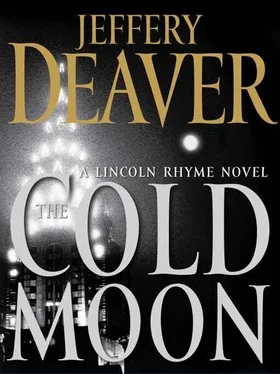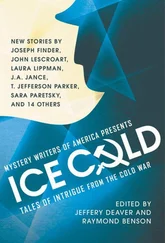He forced himself not to think about it and looked back at the evidence.
Gerald Duncan-dubbed "Perp Lite" by witty Thom-was awaiting arraignment on the infractions he had committed, all minor ones (the DNA analysis revealed that the blood on the box cutter, on the jacket fished out of the harbor and pooled on the pier was Duncan's own, and the fingernail crescent was a perfect match).
The 118th Precinct corruption case was moving slowly.
There was sufficient evidence to indict Baker and Wallace, as well as Toby Henson. Soil at the Sarkowski crime scene and the samples Sachs had collected at Creeley's Westchester house matched trace found in Baker's and Henson's homes. Of course, they had a rope fiber implicating Baker in Creeley's death, but similar fibers were found on Wallace's boat. Henson owned leather gloves whose texture patterns matched those found in Westchester.
But this trio wasn't cooperating. They were rejecting any plea bargains, and no evidence implicated anyone else, including the two officers who'd been outside the East Village social club, who claimed they were innocent. Rhyme had tried to unleash Kathryn Dance on them but they were refusing to say anything.
Eventually, Rhyme was confident, he could find all the perps from the 118th and build cases against them. But he didn't want eventually; he wanted now. As Sachs had pointed out, the other cops from the St. James might be planning to kill more witnesses-maybe even make another attempt on her or Pulaski. It was also possible that one or more of them were forcing Baker, Henson and Wallace to remain silent by threatening their families.
Besides, Rhyme was needed on other cases. Earlier he'd gotten a call about another incident-FBI Agent Fred Dellray (temporarily sprung from financial crimes hell) explained that there'd been a break-in and arson at the federal National Institute of Standards and Technology operation in Brooklyn. The damage was minor but the perp had breached a very sophisticated security system and, with terrorism on everyone's mind, any burglary of a government facility got attention; the Feds wanted Rhyme to assist in the forensic side of the investigation. He wanted to help but he needed to get the Baker-Wallace extortion case wrapped up first.
A messenger arrived with the file on the murder of Duncan's businessman friend, engineered by Baker when the man refused to be extorted. The case was still open-there's no statute of limitations on murder-but there'd been no entries for a year. Rhyme was hoping to find some leads in the older case that might help them identify perps from the 118th Precinct.
Rhyme first went into the New York Times archive and read the short account of the death of the victim, Andrew Culbert. It reported nothing other than that he was a businessman from Duluth and had been killed during an apparent mugging in Midtown. No suspects were found. There was no follow-up to the story.
Rhyme had Thom mount the investigation report on his page-turning frame and the criminalist read through the sheets. As often, in a cold case, the notes were in several different handwritings, since the investigation had been passed on-with progressively less energy-as time passed. According to the crime scene report, there'd been little trace, no fingerprints or footprints, no shell casings (death was from two shots to the forehead, the slugs ubiquitous.38 Specials; a test of the weapons they'd collected from Baker and the other cops at the 118th revealed no ballistics matches).
"You have the crime scene inventory?" he asked Sachs.
"Let's see. Right here," she said, lifting the sheet. "I'll read it."
He closed his eyes so he'd have a better image of the items.
"Wallet," Sachs read, "one hotel room key to the St. Regis, one minibar key, one Cross pen, one PDA, one packet of gum, a small pad of paper with the words 'Men's room' on the top. The second sheet said 'Chardonnay.' That's it. The lead detective from Homicide was John Repetti."
Rhyme was looking off, his mind stuck on something. He looked at her. "What?"
"I was saying, Repetti, he ran the case out of Midtown North. You want me to call him?"
After a moment Lincoln Rhyme replied, "No, I need you to do something else."
It's possessed.
Listening to the scratchy recording of the bluesman Blind Lemon Jefferson singing "See That My Grave Is Kept Clean" through her iPod, Kathryn Dance stared at her suitcase, bulging open, refusing to close.
All I bought was two pairs of shoes, a few Christmas presents…okay, three pairs of shoes, but one was pumps. They don't count. Oh, but then the sweater. The sweater was the problem.
She pulled it out. And tried again. The clasps got to within a few inches of each other and stopped.
Possessed…
I'll go for the elegant look. She found the plastic valet laundry bag and offloaded jeans, a suit, hair curlers, stockings and the offending, and bulky, sweater. She tried the suitcase again.
Click.
No exorcist was necessary.
Her hotel room phone rang and the front desk announced she had a visitor.
Right on time.
"Send 'em up," Dance said and five minutes later Lucy Richter was sitting on the small couch in Dance's room.
"You want something to drink?"
"No, thanks. I can't stay long."
Dance nodded at a small fridge. "Whoever thought up minibars is evil. Candy bars and chips. My downfall. Well, everything's pretty much my downfall. And to add insult to injury the salsa costs ten dollars."
Lucy, who looked like she'd never had to count a calorie or gram of fat in her life, laughed. Then she said, "I heard they caught him. The officer guarding my house told me. But he didn't have any details."
The agent explained about Gerald Duncan, how he was innocent all along, and about the corruption scandal at an NYPD precinct.
Lucy shook her head at the news. Then she was looking around the small room. She made some pointless comments about framed prints and the view out the window. Soot, snow and an air shaft were the essential elements of the landscape. "I just came by to say thanks."
No, you didn't, thought Dance. But she said, "You don't need to thank me. It's our job."
She observed that Lucy's arms were uncrossed and the woman was sitting comfortably now, slightly back, shoulders relaxed, but not slumped. A confession, of some sort, was coming.
Dance let the silence unravel. Lucy said, "Are you a counselor?"
"No. Just a cop."
During her interviews, though, it wasn't unusual for suspects to keep right on going after the confession, sharing stories of other moral lapses, hated parents, jealousy of siblings, cheating wives and husbands, anger, joy, hopes. Confiding, seeking advice. No, she wasn't a counselor. But she was a cop and a mother and a kinesics expert, and all three of those roles required her to be an expert at the largely forgotten art of listening.
"Well, you're real easy to talk to. I thought maybe I could ask your opinion about something."
"Go on," Dance encouraged.
The soldier said, "I don't know what to do. I'm getting this commendation today, the one I was telling you about. But there's a problem." She explained more about her job overseas, running fuel and supply trucks.
Dance opened the minibar, extracted two $6 bottles of Perrier. Lifted an eyebrow.
The soldier hesitated. "Oh, sure."
She opened them and handed one to Lucy. Keeping hands busy frees up the mind to think and the voice to speak.
"Okay, this corporal was on my team, Pete. A reservist from South Dakota. Funny guy. Very funny. Coached soccer back home, worked in construction. He was a big help when I first got there. One day, about a month ago, he and I had to do an inventory of damaged vehicles. Some of them get shipped back to Fort Hood for repairs, some we can fix ourselves, some just are scrapped.
Читать дальше












